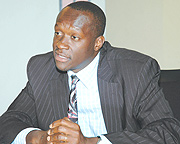ALPHONSE RUTAZIGWA discovers the significance of Rwanda’s language. Languages are symbols of national significance. They portray the strength of any one culture. And a society without any cultural heritage is characterized by lack of identity, which is a fundamental aspect of any community.


ALPHONSE RUTAZIGWA discovers the significance of Rwanda’s language.
Languages are symbols of national significance. They portray the strength of any one culture. And a society without any cultural heritage is characterized by lack of identity, which is a fundamental aspect of any community.
According to Youth, Culture and Sports Minister, Joseph Habineza, culture is the human engine and steering wheel in societies. He says culture seems to shape and determine a person’s way of perceiving and reasoning. The minister cites Kinyarwanda as a language rich since it unites all the Rwandans.
"We shall keep our language intact. Many countries which speak their mother tongue have transformed,” Habineza says in telephone interview last week. The minister explains ignoring culture or language is burying one’s roots.
"A person without culture has no direction,” the minister continues.
Dr. James Vuningoma, Dean Faculty of Arts and Languages at Kigali Institute of Education (KIE), explains that it is important to define a language as a symbol that characterises any culture.
"It is used by all of us who are identified as the source and from that source, we decide on a message we want to put across.”
"The message is sent through a medium of communication which is a language. It can be a Kinyarwanda, English, Lingala, French or any other language,” Vuningoma adds.
According to Innocent Singirankabo, a primary school teacher, languages act as means of imparting knowledge, communication of a variety of information, and it’s through them that different developmental projects can be realised.
Singirankabo continues that languages are a source of pride and symbols of nationalism. Children should first have to master the mother tongue in order to facilitate their learning,” Singirankabo explains.
Josephat Muhire, 80, says he becomes upset when he hears people speaking foreign languages.
"You hear people speak through their noises imitating white men’s languages. Why? I keep on wondering.”
Muhire continues that one’s mother tongue is important: it acts as a common denominator facilitating communication whether at school, in business, or in social situations.
"Communicating to the populace over government programmes becomes easier since everyone understands the language,” Muhire explains.
Minister Habineza says that mixing Kinyarwanda with other languages, undermines the evolution of one language.
James Bugingo is a retired language teacher in Umutara province in Western Province. He says modern schools should up efforts to teach Kinyarwanda, as a way of promoting it.
"In doing so, children will have promoted Kinyarwanda culture,” adds Bugingo.
Urujeni Ancilla, a housewife, wonders why little importance is earmarked for the promotion of languages. She says the way Kinyarwanda is spoken these days is disgusting.
Minister Habineza says the ministry is working hand in hand with other stakeholders in the region to promote Kinyarwanda Language.
Ends


